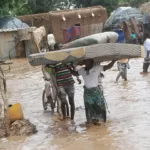
Disastrous floods have aggravated the humanitarian crisis in the Niger Republic, with residents losing homes and families. On Dec. 2, the floods ravaged the Diffa, Maradi, Tahoua, and Tillaberi regions, submerging towns and villages underwater.
Responding to the impending environmental crisis, the United Nations International Children’s Emergency Fund (UNICEF) partnered with the Swedish Agency for International Cooperation and Development (SIDA) and the Swedish Ministry of Foreign Affairs (SweMFA) to assist the victims of the flooding.
The humanitarian organisations have collaborated to distribute emergency kits such as bedsheets, kitchen utensils, mosquito nets and toiletries to the families affected by the floods. UNICEF also collaborated with Niger’s Ministry of Public Health to deploy mobile clinics in the most rural areas where essential humanitarian services are urgently needed. The global charity groups have been able to intensify their operations in the affected zones.
“This international cooperation demonstrates the importance of collective action in the face of natural catastrophes, ” said a senior official of the public health ministry.
The mobile clinics deployed on the ground bring quality healthcare to the most vulnerable people in hard-to-reach communities in Niger.
A UNICEF official, who does not want to be described by name, added that “the floods in Niger have brought to the open the vulnerability of communities faced with climatic shocks”.
The official noted that UNICEF and its partners will reinforce the resilience of communities in the long term by investing in health, education and the protection of children.
According to the Internation Rescue Committee, the Niger Republic is vulnerable to climate shocks, escalating the spate of humanitarian crises in the country. At least 4.3 million people in Niger need humanitarian assistance as they face the combined impacts of conflict and climate shocks, the IRC noted in a report.
Disastrous floods in the Niger Republic have exacerbated an already dire humanitarian crisis, affecting regions such as Diffa, Maradi, Tahoua, and Tillaberi, leaving many residents displaced.
In response, UNICEF has partnered with the Swedish SIDA and SweMFA to provide critical aid, including emergency kits and the deployment of mobile clinics in rural areas, enhancing access to essential medical services.
A senior official emphasized the need for global cooperation in tackling natural catastrophes, while a UNICEF representative highlighted the vulnerability of communities to climate shocks. Efforts will focus on reinforcing community resilience through investments in health, education, and child protection.
According to the International Rescue Committee, at least 4.3 million people in Niger require humanitarian aid due to conflicts and climate challenges.
